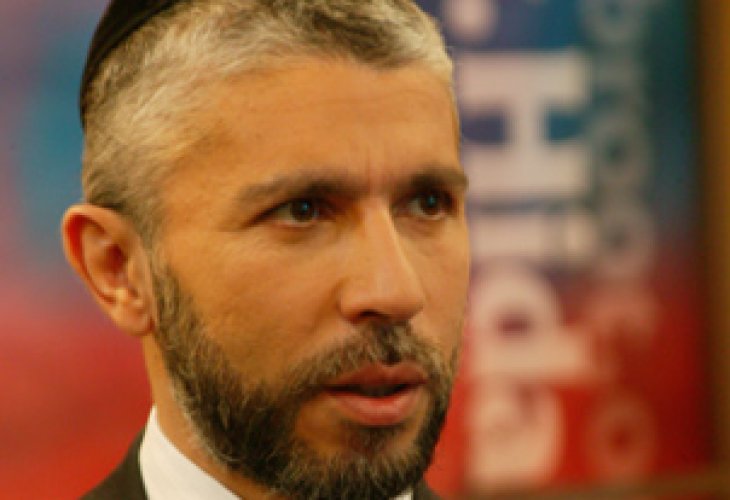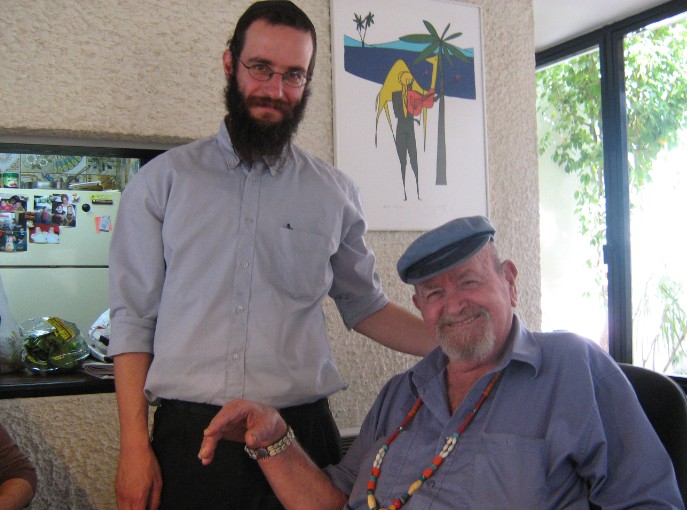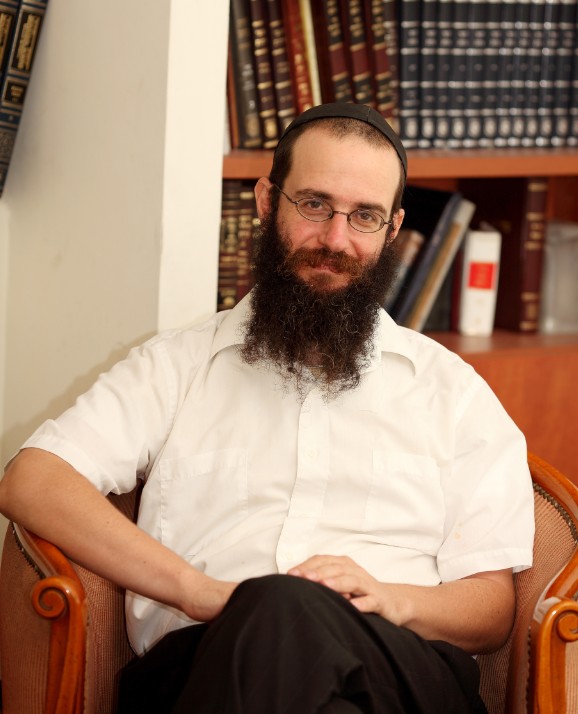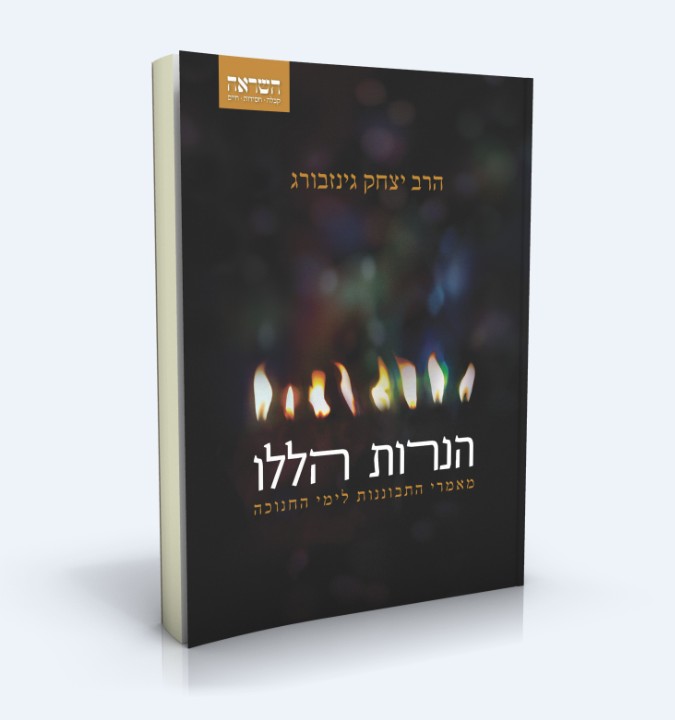Nir Manos: "I Felt I Couldn't Continue Living in a Meaningless World"
Nir Manos, son of journalist and satirist Didi Manos, grew up in a very secular home and was called 'Neil.' It was during his university studies that he began to understand the declining trend of Western civilization and realized that only the Torah offers real answers and a reason to live.

Nir Manos, a writer, thinker, and lecturer who is also a Chabad Hasid and father of six, was known as 'Neil' for the first three decades of his life. Manos grew up in a very secular home, son of Didi Manos – a journalist, satirist, and lyricist known for his criticism of religion and religious people. Before his circumcision, Manos's parents planned to name him 'Neil.' However, at the last moment, they changed their minds, and his name was officially 'Nir' in Israel. But the saga didn't end there: after a few weeks, the parents regretted their change of heart, and the newborn was once again called Neil.
"My father used to tell me that 'Neil' is a plant mentioned in the Talmud," Manos recounts. "During my return to faith, I discovered precisely where it is mentioned – it is the 'Kala Ilan,' the plant used to counterfeit the blue dye of the tzitzit! 'Great,' I told my father, 'the plant 'Neil' is mentioned in the Talmud, but not in a positive context.' If that wasn't enough, I discovered another remarkable fact: the only place in the Torah where the word 'Nir' appears is in the portion of the week I was born, the Parashat Chukat: 'And their kingdom was lost' (in Biblical terms, 'Nir' refers to a kingdom). Thus, the hesitations ended, and Manos returned to the name proclaimed upon him at the ceremony 'And he called him in Israel.'
 With his father Didi Manos
With his father Didi ManosThe change in first name was preceded by a deep and unconventional journey of strengthening faith. Manos wasn't just non-religious: "I had a very secular and leftist ideology," he testifies about himself. "I belittled anything related to religion in general and Judaism in particular."
Surprisingly, his university studies at the Hebrew University opened him to Judaism. "The more you study history and philosophy, the more you realize that many things you considered certain and absolute as a secular person – aren’t so. You discover that secularism is a relatively new phenomenon in history and, on a global scale, is also a relatively small phenomenon because most cultures are religious. This knowledge puts your prejudices in perspective. I also studied the philosophy of science, which strengthened my understanding that scientific knowledge is based on certain fundamental assumptions and that, with different assumptions, you can reach different conclusions. This also made me view things differently."
Manos's previous perceptions were also challenged by a meeting with a student of Rabbi Yitzchak Ginsburgh named Moshe Genut, who was studying at the university at the same time. "Until then, I believed that if you were intellectual, you became less religious, and vice versa. Suddenly, I met someone for whom learning was part of his service to Hashem and subordinate to his faith. We had many interesting conversations that shattered my arrogance and opened my mind."
Suddenly, Manos says, he began to look around at the secular world and didn't like what he saw. "I understood that Western culture is in a kind of disintegration. The culture is becoming more materialistic, committed relationships are disappearing, and there is no spiritual answer. This troubled me and led me to search among religions in general, and especially in Judaism."
Although the connection to Judaism began with a student of Rabbi Ginsburgh, the deeper connection to the teachings of the rabbi himself only began when Manos met his wife. "Together, we began studying Rabbi Ginsburgh's Torah teachings, and I discovered a vast and deep world that spoke to me greatly." Initially, he would attend lessons without really understanding the teachings. "For three years, I attended without understanding anything. I simply felt that Rabbi Ginsburgh's teachings suited me, to the root of my soul, and I had to decipher them. Slowly but surely, I began to understand."
At some point, the connection with the rabbi was established, and he suggested that Manos write a sample lesson. "I wrote one lesson, showed it to him, and he made numerous notes and additions. We sat together for several meetings, going over all the remarks, and it was one of the most wonderful experiences of my life." From this point, Manos became one of the editors of Rabbi Ginsburgh's Torah teachings, resulting in three published books, as well as brochures and online articles.
Beyond the Realm of Reason
Although Manos's return to faith took a highly intellectual form, the turning point in his journey, he says, was "in a place entirely beyond reason."
"I had a very significant mental and physical breakdown. I felt I couldn’t continue living if the world was meaningless, if everything was just matter and blind causality. I began experiencing panic attacks. I felt I couldn't continue as usual. Either I end my life, or I change my life."
This emotional distress also manifested in physical symptoms. "I had a rash on my body – and doctors found no explanation or treatment. And suddenly, during this period of anxiety, rash, and lack of sleep – I had a dream. A dream in which I was exposed to a spiritual world I had never known, and from which I woke up a different person. I felt the rash was a sign: I was shedding my skin and being reborn. Finally, I came to the realization that there is a spiritual reality, there is a soul." This realization, he says, was beyond the intellect. "Basically, I reached the edge of reason. When you exhaust intellectual contemplation, you reach the border of logical thought, and from there, you can glimpse beyond. In the end, what I found there was the faith in the Torah from the heavens, in 'we will do and we will hear'..."
 Nir Manos
Nir ManosHow did your parents deal with your return to faith?
"Gradually. At first, my father was very apprehensive, mainly because he feared I would sever ties. When he saw that the opposite was true, that I was strengthening the connection – and even more so, when I got married and grandchildren came – something changed in him. His views softened. At some point, he expressed that he understood us. He looks at the moral decline around him and understands our choice.
"For my mother, it was easier to accept. She originally came from a religious home, and our return to faith stirred memories from her father's house and warmed her heart."
What about your connection with friends from the past?
"Initially, there was some distance, as the common ground shrank significantly. At first, I was also in a state of seclusion: it was as if I needed to enter a darkroom to develop new images. Later, when Facebook suddenly emerged, I began renewing connections. There are conversations, meetings, a lot of mutual enrichment. I see how much I have to thank Hashem for awakening me to return to faith: I had the merit to marry at the age of 29, and I was blessed with children. Many of my friends aren't married or don't have children."
Manos emphasizes that he doesn't believe in 'returning others to faith.' "There's no such thing as causing someone to return to faith, only in returning yourself to faith. I try very much to remember that Hashem plans various paths for people. There's a concept of 'I will seek Your face, Hashem,' where seeking leads to revelation. It's very personal. However, I don't think one should settle for 'live and let live' – it's a form of apathy and alienation. The middle path between coercion and indifference is sharing the Torah you've discovered with others. I've established a study group for Pirkei Avot in Ramat Gan, for example, with friends from the past, and they are very happy about the opportunity to get to know and study. I think anyone with a connection to the Torah and Judaism should try to share and teach others."
Do you feel there is a greater openness to Jewish learning?
"In the younger generation, the anti-religious sentiment has greatly diminished. That opposition belonged to the ideological wars of previous generations, but today there is only a massive lack of knowledge. When I walk around Tel Aviv, I feel much more openness, compared to twenty years ago. People really want to know and learn. The cynical opposition has greatly weakened."

Greek Wisdom in the Service of the Torah
These days, a book edited by Manos, 'These Candles,' is about to be published, which contains Rabbi Ginsburgh's insights on Chanukah. "The book includes eight articles, each focusing on a different aspect of Chanukah. There is a whole article on the difference between light and heat, where light is a metaphor for the righteous and heat is a metaphor for the heroes. There is a whole article on the dreidel; there is an article discussing the fact that the Chanukah candles are the opposite of the Temple menorah: it is lit outside, at night, at a height above ten handbreadths. What does all this mean? Another article on Greek philosophy and how to fix it with the Torah..."
Chanukah, Manos says, is a holiday that everyone loves. "A holiday that connects the religious and secular worlds. It's not from the Torah but from history, from the life realities of the Jewish people. However, each world emphasizes one aspect: the religious world – the miracle of the oil flask and the fact that the Hasmoneans were righteous, the secular world – the victory in war and the fact that the Hasmoneans were heroes. But the word 'Hasmonean' in gematria is 'righteous' plus 'hero.' In Chanukah, there are both sides.
The book talks about Chanukah not being a holiday of rejecting Greek culture but rather raising sparks from it. Our sages did accept, for example, the science of the Greek sages. They interpreted 'God shall enlarge Japheth, and he shall dwell in the tents of Shem,' meaning 'The beauty of Japheth [father of Greece] should be in the tents of Shem.'
"This book is a closing of a circle for me," concludes Manos. "When I studied philosophy at the university, I loved Greek philosophy very much. On the other hand, I always felt it wasn’t enough for me. When I began getting to know Judaism, I saw that the Torah provides answers in places where philosophy ends. The book attempts to show how the light of the Torah is infinitely greater than Greek culture, and at the same time, the truth and beauty within Greece can be converted and incorporated into Judaism to help it grow even further."

